To stay safe and self-sufficient during a disease outbreak, focus on understanding how viruses spread and adopt strict hygiene practices like thorough handwashing and disinfecting surfaces daily. Build an emergency kit with essentials, including medications, non-perishables, and sanitation supplies. Keep your environment clean, stay informed through reliable sources, and establish communication plans with loved ones. Managing health needs, mental resilience, and financial preparedness are key—continue exploring these strategies to better protect yourself and your community.
Key Takeaways
- Maintain thorough hygiene practices, including frequent handwashing and disinfecting surfaces, to prevent disease transmission.
- Stockpile essential supplies like medications, non-perishable food, masks, and first aid items for self-sufficiency.
- Establish clear communication plans with family and community to ensure accurate information sharing during crises.
- Prepare your living environment by regular cleaning, pest control, and using air purification to improve indoor safety.
- Prioritize mental health through stress management, staying connected, and practicing resilience to navigate prolonged outbreaks.
Understanding How Pandemics Spread
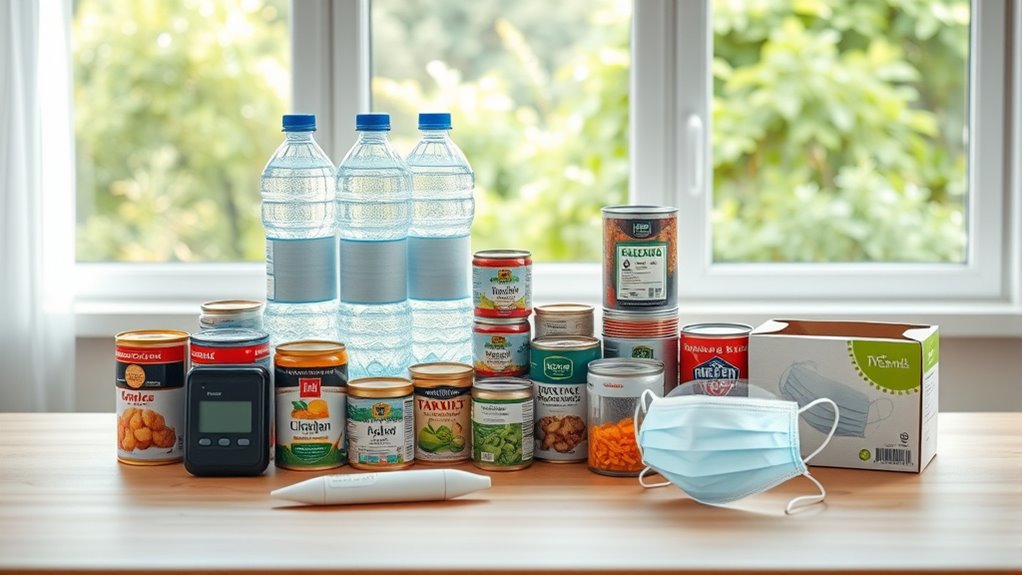
Understanding how pandemics spread is essential to controlling their impact. Viral transmission occurs when infected individuals release particles through coughing, sneezing, or talking, which others inhale or touch. Recognizing these pathways helps you grasp outbreak dynamics, such as how quickly a virus can spread in crowded settings. Factors like close contact, poor hygiene, and shared surfaces accelerate transmission, making outbreaks more severe. By understanding these mechanisms, you can take proactive steps to reduce your risk, like practicing good hygiene, maintaining physical distance, and avoiding crowded places. Knowledge of transmission pathways and how viruses move through communities enables you to better prepare and implement effective containment measures, ultimately helping to protect yourself and others during a pandemic. Staying informed about infection routes can also help you identify the most effective prevention strategies. Additionally, understanding the role of social behavior in spreading infections underscores the importance of community cooperation in containment efforts. Being aware of mental health effects that may arise from outbreaks can also support emotional resilience during stressful times.
Building a Comprehensive Emergency Kit
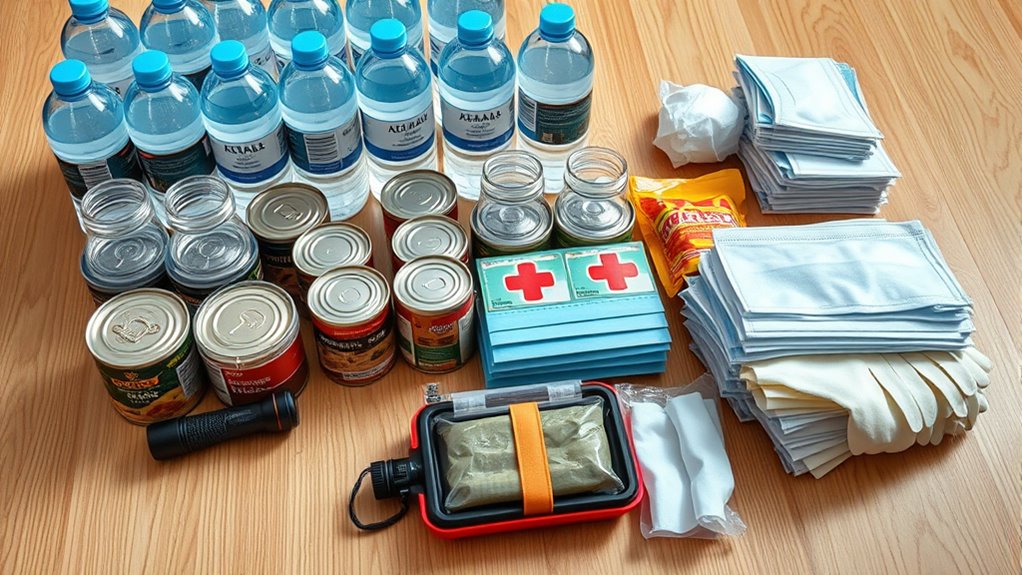
Have you ever considered what essentials you’d need if an emergency suddenly strikes? Building a comprehensive emergency kit is vital for pandemic preparedness. Start by including medications you regularly take, along with extra supplies to manage your medication needs during disruptions. Make certain to organize your medication management plan, including prescriptions and instructions. Don’t forget to add basic first aid supplies, hand sanitizer, masks, and cleaning items. Keep a list of emergency contacts, including family, friends, and local health authorities, in case communication lines are down. Store these items in a sturdy, accessible container, and regularly check to replenish supplies. Being aware of production quantity variances can help you better understand supply chain disruptions and plan accordingly. Familiarizing yourself with food preservation techniques can also enhance your self-sufficiency during extended emergencies. Understanding public health guidelines is essential to ensure proper safety measures are followed during a disease outbreak, especially when considering safe food storage practices. Additionally, maintaining proper hygiene with air purifier maintenance can significantly improve indoor air quality, reducing the risk of airborne infections. Being prepared with the right essentials ensures you can stay safe and self-sufficient during a disease outbreak.
Implementing Effective Hygiene Practices
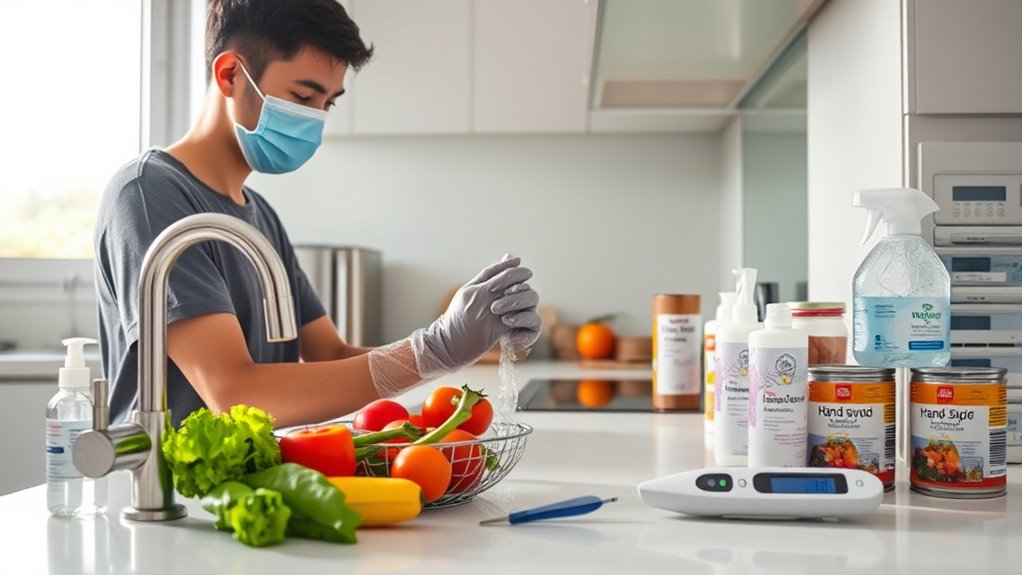
Practicing effective hygiene is one of the most important steps you can take to prevent the spread of illness during a pandemic. Regular hand hygiene is essential; wash your hands thoroughly with soap and water for at least 20 seconds, especially after touching surfaces or coming into contact with others. When soap and water aren’t available, use an alcohol-based hand sanitizer. Surface disinfection also plays a critical role; clean frequently touched objects like doorknobs, light switches, and electronic devices daily with disinfectant wipes or sprays. Avoid touching your face with unwashed hands, and always wash your hands before eating or after coughing or sneezing. Implementing air purification technology such as HEPA filters can further reduce airborne contaminants and enhance your home’s safety. These simple practices markedly reduce the risk of transmitting germs and help keep you and those around you safer during outbreaks. Incorporating indoor air quality monitoring can assist in maintaining a healthier environment by providing real-time data on pollutant levels. Utilizing HEPA filtration can effectively capture airborne particles, further improving your indoor air quality. Additionally, Kia Tuning modifications like upgraded air intake systems can enhance engine performance while potentially improving filtration efficiency, contributing to overall vehicle safety and reliability. Engaging in automated data analysis can also help identify patterns of contamination or air quality issues, allowing for more targeted interventions.
Creating a Safe and Clean Living Environment

Creating a safe and clean living environment is essential for reducing the risk of infection during a pandemic. Ensuring good indoor air quality helps prevent airborne viruses and bacteria from lingering in your space. Use air purifiers, regularly open windows, and change filters to improve ventilation. Incorporate HEPA filters to effectively capture airborne pathogens and allergens, enhancing overall air safety. Keep your home free of pests, as they can carry pathogens and compromise your health. Implement pest control measures like sealing entry points and maintaining cleanliness to deter rodents and insects. Regularly disinfect surfaces, wash bedding, and declutter to reduce hiding spots for pests. Additionally, integrating automation technologies can help monitor and maintain a healthy environment more effectively. Proper beneficiary designation is crucial because mistakes can lead to significant tax liabilities and reduce the benefits of your estate planning. Staying informed about AI-driven security systems can further enhance your home protection against emerging threats. Incorporating lifestyle strategies such as remote work or a clean workspace can further promote overall well-being. By prioritizing indoor air quality and pest control, you create a healthier environment that minimizes infection risks and supports your overall well-being during outbreaks.
Establishing a Communication Plan With Family and Community
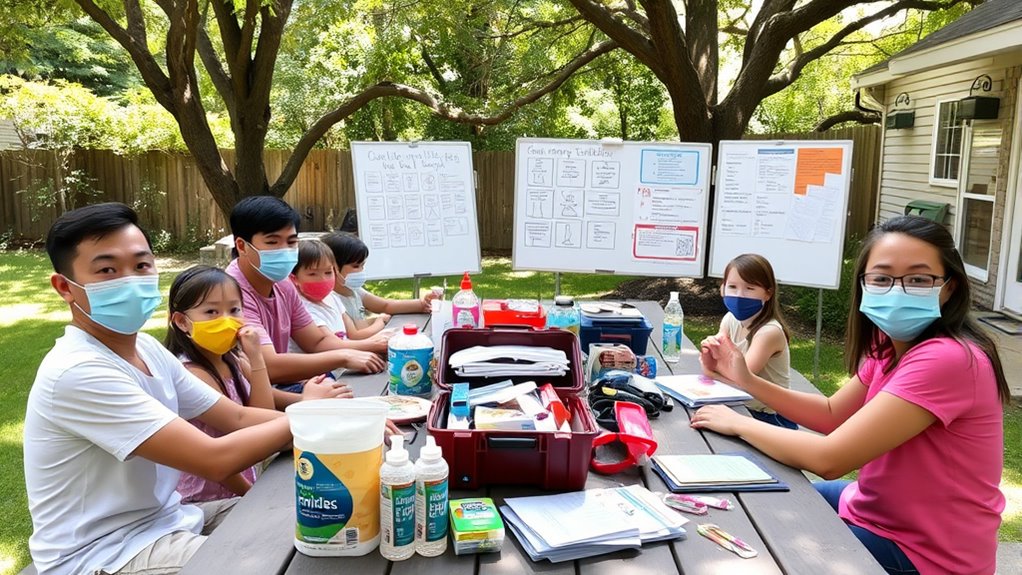
Why is establishing a communication plan with your family and community essential during a pandemic? It ensures everyone stays informed, connected, and able to respond quickly during emergencies. Clear family communication helps prevent panic and confusion, while community coordination fosters mutual support and resource sharing. By having a plan, you reduce misinformation and ensure crucial updates reach all members. Incorporating effective communication strategies can significantly improve response times and safety measures during outbreaks.
Consider these key points:
- Designate a primary contact person for family updates and emergency info
- Use multiple channels like phone, messaging apps, and social media for redundancy
- Establish local community groups to share resources and coordinate efforts
This plan keeps everyone on the same page, enhances safety, and strengthens your collective resilience during disease outbreaks.
Securing Food and Water Supplies for Extended Periods

To prepare for an extended crisis, you need to stockpile essential goods and water. Learning effective water purification methods and storing food long-term can make a big difference. Taking these steps now helps guarantee you’re ready when supplies are scarce. Regularly inspecting and maintaining your supplies ensures their effectiveness over time preventing spoilage or contamination. Incorporating air purifier maintenance into your routine can also help you respond more effectively during unexpected disruptions. Recognizing the importance of trust in your preparations can help you better manage your resources and relationships during a crisis. Additionally, understanding the effectiveness of various water purification methods ensures you choose the safest options for your family.
Stockpiling Essential Goods
During a pandemic, having a well-stocked supply of essential goods becomes crucial, especially for food and water. You need to guarantee your stockpile remains safe and reliable despite disruptions in the supply chain. Focus on storing non-perishable foods with long shelf lives, such as canned goods, grains, and dried fruits. Prioritize food safety by checking expiration dates regularly and rotating supplies. To prevent shortages, diversify your sources and avoid over-reliance on a single supplier. Keep an ample supply of bottled water or water storage containers to meet your needs during extended periods.
- Canned vegetables, beans, and meats to maintain nutrition
- Bulk grains like rice and oats for versatility
- Bottled water and water purification supplies
Water Purification Methods
Ensuring your water supply remains safe during a prolonged emergency requires knowing effective purification methods. Water filtration is essential; use a high-quality filter to remove bacteria, parasites, and sediment. For additional safety, purification tablets can quickly disinfect water, killing viruses and remaining pathogens. Always follow the instructions on the tablets for proper dosage and contact time. Combining filtration with purification tablets ensures cleaner, safer water for drinking and cooking. If filtration devices aren’t available, boiling water for at least one minute is a reliable alternative. Keep a supply of both water filters and purification tablets in your emergency kit. These methods help you maintain a safe water supply, reducing the risk of waterborne illnesses during extended crises.
Long-Term Food Storage
Have you prepared your food and water supplies for the long haul? Long-term food storage is essential for pandemic preparedness. To guarantee your supplies last, focus on proper food preservation techniques and using suitable storage containers. Select food items like grains, dried beans, and canned goods that store well over time. Use airtight, durable storage containers to prevent spoilage, pest intrusion, and contamination. Rotate your stock regularly to maintain freshness, and consider vacuum-sealing perishables for extended shelf life. Keep your storage area cool, dry, and dark to slow food deterioration. By investing in high-quality storage containers and practicing good food preservation methods, you’ll build a reliable, long-lasting food supply that keeps you self-sufficient during extended outbreaks.
Managing Health and Medical Needs at Home
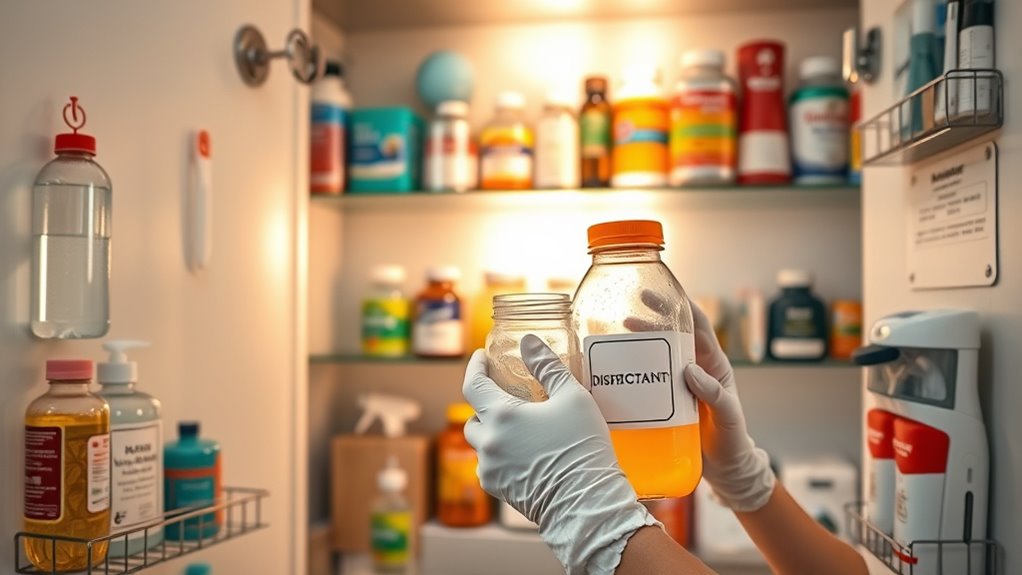
To manage your health and medical needs at home effectively, you should stockpile essential medications in advance. Staying connected with your healthcare providers through telehealth guarantees you can get advice and support when needed. Taking these steps helps you stay prepared and maintain your well-being during a pandemic.
Stockpile Essential Medications
Are you prepared to manage your health needs during a crisis? Stockpiling essential medications guarantees medication accessibility when pharmacies might face shortages or disruptions. Start by reviewing your prescriptions and consulting with your healthcare provider to determine what to keep on hand. Maintain an organized list of your medications, dosage, and refill dates. Establish pharmacy coordination early, so you know where to get refills or emergency supplies if needed. Consider storing medications in a cool, dry place and keep extra supplies for at least a month. Be aware of any special storage instructions or expiration dates to ensure effectiveness. A well-planned stockpile helps you stay safe and self-sufficient, even when access to healthcare services is limited.
Maintain Telehealth Connections
Maintaining strong telehealth connections guarantees you can access healthcare and medical advice without leaving home, especially during a crisis when in-person visits may be limited. Telehealth benefits include convenient virtual healthcare access, reducing exposure risks and saving time. To make certain reliable communication, test your devices and internet connection regularly. Keep your healthcare provider’s contact information handy and update your health records digitally. Familiarize yourself with the telehealth platform you’ll be using so consultations go smoothly. Having a list of current medications and symptoms ready can streamline your virtual visits. Staying connected with your healthcare team through telehealth means you can manage ongoing conditions, get prescriptions, and seek urgent advice promptly. This proactive approach helps maintain your health and peace of mind during outbreaks.
Staying Informed With Reliable Information Sources
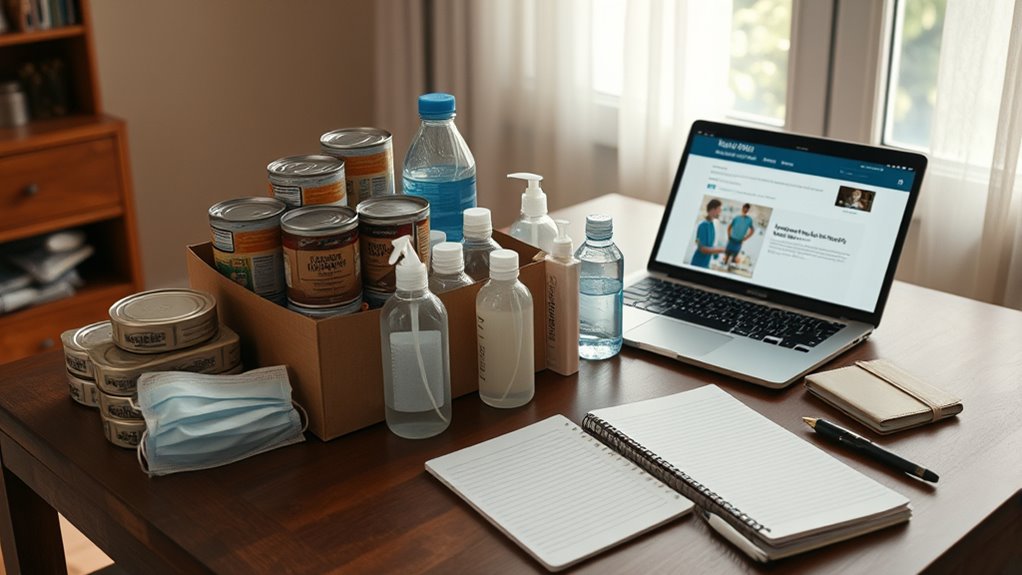
How can you guarantee you’re getting accurate updates during a pandemic? Rely on trusted sources dedicated to public health and misinformation management. To stay informed, consider these strategies:
- Follow official health organizations like the CDC and WHO for timely, evidence-based updates.
- Cross-check news from reputable outlets to avoid misinformation.
- Subscribe to alerts from local health departments for region-specific guidance.
Developing a Financial and Legal Preparedness Strategy
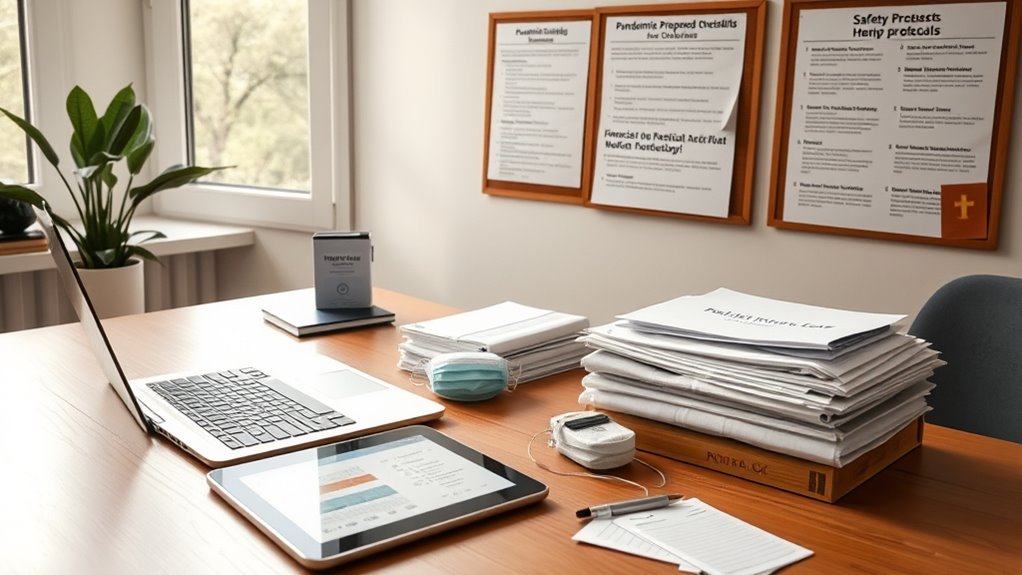
Staying informed about public health updates helps you understand the risks and necessary precautions during a pandemic, but it’s equally important to prepare your finances and legal matters to withstand potential disruptions. Start with insurance planning by reviewing your policies to ensure adequate coverage for health, income loss, and property damage. Consider adding or updating policies as needed. Next, organize your legal documentation, including wills, powers of attorney, and healthcare directives, so your wishes are clear and accessible if you become unable to communicate. Keep digital and physical copies in a secure location. These steps help protect your assets and ensure your legal preferences are upheld, giving you peace of mind and stability during uncertain times.
Maintaining Mental and Emotional Well-Being During Crises

During a crisis, your mental and emotional health can be deeply affected, making it essential to actively prioritize your well-being. Practicing mindfulness exercises helps you stay present and reduce anxiety, fostering emotional resilience. To support your mental health, consider creating a daily routine that includes short meditation sessions or deep breathing exercises. Stay connected with loved ones through calls or messages, which provides emotional support and reduces feelings of isolation. Limit exposure to distressing news to prevent overwhelm, and focus on what you can control. Incorporating these strategies helps you maintain a balanced mindset, stay resilient, and navigate challenging times with greater strength. Remember, taking care of your mental health is just as important as physical safety during any crisis.
Frequently Asked Questions
How Can I Identify False Information During a Pandemic?
During a pandemic, it’s essential to recognize false information. To do this, focus on misinformation detection by checking the credibility of sources. Look for information from reputable organizations like health agencies and scientific experts. Be cautious of sensational headlines and avoid sharing unverified data. Always cross-reference facts with trusted sources, and if something seems suspicious, take a moment to verify before spreading it. Staying informed helps keep you and others safe.
What Are Alternative Methods to Communicate if Internet Access Is Limited?
Oh, imagine having no internet during a crisis—what a surprise! When connectivity fails, you can rely on amateur radio to reach others or set up a community bulletin board in your neighborhood. These methods might seem old-fashioned, but they work wonders when digital lines go dark. So, keep that radio handy and spread the word locally—because sometimes, the simplest tools keep us safest.
How Do I Manage Pet Safety and Health During Outbreaks?
You need to prioritize your pet’s safety and health during outbreaks by ensuring proper pet nutrition and having a plan for veterinary emergencies. Keep a well-stocked supply of food, medications, and essential supplies, and stay updated on local veterinary services. If you encounter emergencies, contact your vet promptly and have a backup plan in case of service disruptions. Regular health checkups can help prevent issues before they escalate.
What Legal Rights Do Tenants Have During a Quarantine?
Imagine being confined at home, your rental rights suddenly more important than ever. During a quarantine, you have eviction protections that prevent landlords from evicting you solely for inability to pay rent. Laws vary by state, but generally, tenants are protected from sudden eviction, and landlords must follow specific legal procedures. Stay informed about your rights, communicate with your landlord, and seek legal advice if necessary to guarantee your safety and stability.
How Can I Support Vulnerable Neighbors Safely During a Pandemic?
You can support vulnerable neighbors by engaging in community outreach and resource sharing. Offer to pick up groceries or medications, respecting social distancing and health guidelines. Regularly check in with them via phone or online to provide emotional support. Sharing resources like masks, sanitizers, or informational materials helps keep everyone safe. Your active involvement fosters a stronger, more resilient community, ensuring no one feels isolated or unprepared during a pandemic.
Conclusion
By staying prepared, you naturally create a safer, more resilient environment for yourself and loved ones. Sometimes, it’s funny how a simple plan can unexpectedly make a tough situation easier, like finding that extra mask just when you need it most. Remember, your efforts not only protect your health but also bring peace of mind—proof that small, consistent steps can turn unexpected challenges into manageable moments. Stay prepared, stay safe.










